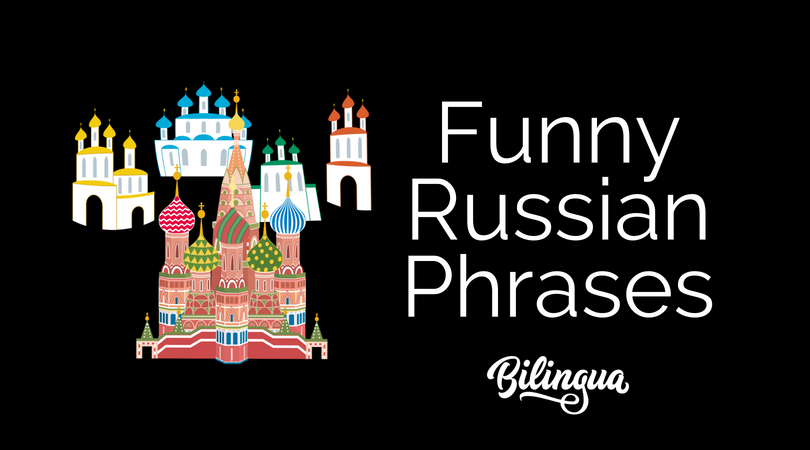Funny Russian Phrases
Did you know that Russian is the 8th most spoken language in the world with around 166 million native speakers?
Many people believe Russian to be one of the toughest languages to learn. Yet, whether it has to do with the many remakes of Anna Karenina or with the ubiquitous presence of Saint Basil’s Cathedral in the popular imagination, millions of people around the world are keen to learn this language.
The “Great and Mighty” Russian Language
Why might you want to learn Russian? Russia is the largest country in the world and hence brings forth enormous business opportunities. If you have business ties in Russia, knowledge of this language can help in forging stronger bonds.
Historically Russia has played a major role in world events, and it still does.
Russian literary history is also one of the richest with notable Russian writers like Dostoevsky, Chekhov, Tolstoy, and Turgenev being read in translation all over the world. With mastery of the Russian language, you will be able to access the classics in the original.
Finally, Russian is a very beautiful and rich language. Native speakers call their language “great and mighty,” thanks to a Russian writer – I.S. Turgenev.
To help you in the quest of learning Russian language, how about starting somewhere fun? Below are some amusing Russian phrases. 😀
Russian Sayings
The Russian language incorporates many idioms and sayings to express a piece of wisdom or an outlook about life. Many Russians wouldn’t lose a chance to throw in an expression in any situation that comes up that can lend itself to the resuscitation of an idiom. For the novice learners, some of the Russian language phrases may sound hilarious when translated. Test my theory with these:
1. Блин (blin)
This is a Russian word that literally means a pancake and is used to express strong negative emotions in place of a curse word. Using this phrase is a polite way to express annoyance, disappointment, surprise, etc. Blin!
2. Да нет, наверное (da net, navernoye)
This is a famous Russian expression, one which can be quite confusing for foreigners. It translates to “Yes no, probably,” however, make no mistake and don’t hold your breath–the actual meaning is “Probably no.”
3. После дождичка в четверг (posle dozhdichka v chetverg)
This is another saying which means “Never.” But it literally translates to “After a rain on Thursday.”
Когда рак на горе свистнет has also the same meaning and is translated as “When a crayfish whistles on the mountain.” The meaning of both phrases is based on broken logic–the crayfish cannot whistle, and there might be no rain on Thursday at all. Therefore, both expressions are used to describe events that are most likely never going to come to pass. Pretty colorful, right?
4. Гвоздь программы (gvozd’ programmi)
This phrase has a funny translation: “The nail of the program.” Russians use this expression to describe something or someone that was the highlight of the show. Reminiscent of how in English, youngsters would say–so-and-so nailed it!
People believe that the expression stems from the 1889 World Fair in Paris. The schedule of this fair coincided with the opening ceremony of the great Eiffel Tower (to many, Eiffel Tower looked like a nail at that time). The phrase was probably coined by the media, created a sensation, and gave birth to this crisp expression.
5. Конь не валялся (kon’ ne valyalsya)
“A horse did not roll around,” the said phrase means that the things that should have been done are not even started yet.
The Russian peasants had a habit of giving some time for the horses to lie down before starting work. In due time, the horses would stretch their muscles. Hence, the delay in starting work gave rise to this expression.
6. Разуй глаза! (razyi glaza)
Russians use body features especially eyes to describe several situations. Literally, this saying means to take off your eyes. However, in Russian it is used to tell someone to pay attention or bringing to notice of something behind the scene. People use this phrase as the equivalent of, “Don’t you see what’s going around? Use your eyes!”
7. Дарёному коню в зубы не смотрят (daryonomu konyu v zubi ne smotriat)
This phrase translates to a familiar saying, “Don’t look a gift horse in the mouth.”
Horses’ teeth tell a lot about their age and checking its teeth is especially important before buying a horse. The idiom implies: Don’t find fault in the gift, take whatever it is and be grateful (because you’re getting a gift, not buying a horse).
8. Яблоку негде упасть (yabloku negde upast’)
“There is no place for an apple to fall down.” The actual meaning of the phrase is that there is no space or the place is full.
9. Ни в зуб ногой (ni v zub nogoi)
The phrase translates to “Not in one tooth with a foot.” As the imagery would suggest, it describes a sense of being gauche, of not knowing anything about a particular matter.
10. Что-то с чем-то (shto-to s chem-to)
This is an indicative phrase for something remarkable. Russians use this phrase to express that something is outstanding or superlative.
Russia is known for its long dreary winters and the gloomy views of some of its most popular novelists. What we skip seeing in the cliché is the humor and wit buried in Russian everyday expressions. Idioms are always important for learning any language because they give us a rather precious glimpse into how a tradition of sayings passed down makes for an outlook in life. And in the “outlook” reflected in some of these funny Russian phrases, you find a good dose of humor and humility.
If you liked this, travel the world with more of our articles:
A Deep Look into Arabic Influence in Spanish
How to Become a Polyglot: 21 Quick and Versatile Tips
Most Beautiful French Words That Will Impress Anyone




